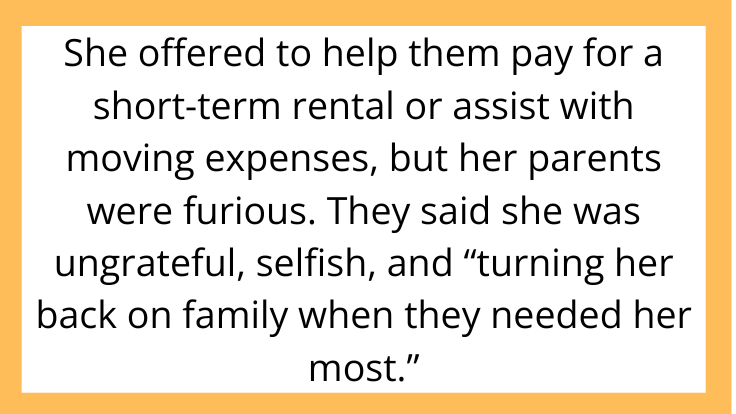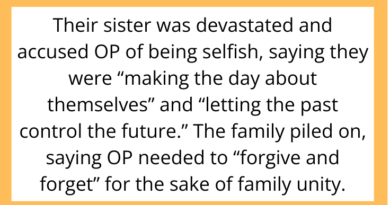AITAH for Refusing to Let My Parents Move in After They Sold Their House Without Telling Me?
Family can be complicated—especially when it comes to boundaries, expectations, and the place you call home. In today’s AITAH scenario, one adult child’s refusal to take in their parents sparked a full-blown family feud. Is it heartless to say no, or just self-preservation?
Let’s get into the details.
The Story: A Surprise Announcement

A 32-year-old woman—let’s call her Lauren—shared her dilemma on r/AITAH. For the past seven years, she has owned her own home. She worked multiple jobs through her twenties to save enough for a down payment, and she takes great pride in having her own space.
Her parents, both in their late 50s, had lived in her childhood home for over 30 years. Without discussing it with Lauren, they decided to sell the house to cash out the equity and retire early. They told her about the sale only after it was finalized—and after the closing date was set.
A week later, they showed up at her door with moving boxes and the expectation that she would let them live with her “for a while.”
The Conflict: When Family Assumes You’ll Just Say Yes

Lauren was stunned. She had never been consulted or even asked if she was comfortable having them move in. She explained that her home simply didn’t have the space: it was a modest two-bedroom bungalow with one bathroom and no spare room set up for long-term guests.
She offered to help them pay for a short-term rental or assist with moving expenses, but her parents were furious. They said she was ungrateful, selfish, and “turning her back on family when they needed her most.”
Her siblings quickly took sides—some agreeing she had every right to say no, others saying she was heartless for refusing to take them in.
The Internet Reacts: Who’s in the Wrong?

When Lauren posted her story, Reddit’s r/AITAH community quickly weighed in. Most commenters overwhelmingly supported her decision.
Why People Sided With Lauren:
-
No Communication: Her parents sold their house without discussing the impact on her.
-
Assumed Obligation: They didn’t ask—they decided she would take them in.
-
Personal Space: She worked hard to have her own place, and losing that autonomy would be a huge emotional sacrifice.
One top comment read:
“They didn’t even give you the courtesy of a conversation before selling your childhood home. That’s not your burden to carry.”
The Other Perspective: Family Should Help Family
However, some people empathized with her parents:
-
They were counting on family support in retirement.
-
They may have assumed it was normal for adult children to care for aging parents.
-
The housing market made it difficult to find affordable options quickly.
A few commenters suggested that Lauren could have offered at least temporary housing while they searched for something else. But even those voices largely agreed that it was unfair of her parents to spring it on her without warning.
Boundaries and Guilt: Why This Hits So Hard

This scenario strikes a nerve because it touches on deeper issues: guilt, obligation, and generational expectations.
Many people grow up believing they must always put family first—no matter the cost. But that thinking can lead to resentment and burnout when boundaries are ignored.
Lauren wasn’t rejecting her parents as people. She was rejecting an expectation she never agreed to.
Could There Have Been a Better Solution?

Probably. Open communication before her parents sold their home would have allowed everyone to make a plan together. Options could have included:
-
Downsizing to a smaller house rather than selling outright
-
Renting an affordable apartment nearby
-
Setting clear expectations about financial contributions if moving in
-
Exploring community resources for early retirees
Instead, her parents made a major life decision and expected Lauren to clean up the fallout.
The Takeaway: It’s Okay to Say No

Refusing to let someone move into your home doesn’t mean you don’t love them. It means you value your peace and autonomy.
Setting boundaries isn’t selfish—it’s necessary.
In this case, most people agreed that Lauren was not the villain. She offered help in other ways and was under no obligation to give up her home because of someone else’s choice.



